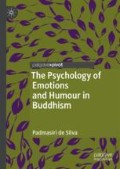Abstract
Fear in the Buddhist discourses appear under psychological, ethical, and religious contexts. In the psychological context Buddhism refers to the subliminal facets of fear and anxiety, as is also presented by Ledoux in emotion studies. Under the ethical, we get the Buddhist notion of shame of evil and dread of evil and from a psychological point of view morally deficient fears are also based on attachments. The roots of delusion, greed, grasping and attachment are at the base of fear and anxiety. Even a monk gone to the forest, if defilements are present in him, this causes fear and dread. Existentialist thinking has their own interpretation of anxiety which offers parallels to Buddhist thinking.
Access this chapter
Tax calculation will be finalised at checkout
Purchases are for personal use only
References
Damasio, A. (2017, August 7). Book Review of Why Buddhism Is True. Edited by Robert Wright. New York Times.
de Silva, P. (1991). Twin Peaks: Compassion and Insight. Singapore: Buddhist Research Society.
de Silva, P. (2007). Explorers of Inner Space: The Buddha, Krishnamurti and Kierkegaard. Ratmalana, Sri Lanka: Sarvodaya Vishvalekha.
de Silva, P. (2014). An Introduction to Buddhist Psychology and Counselling. London: Palgrave Macmillan.
Epstein, M. (1995). Thoughts Without a Thinker (p. 126). New York: Basic Books.
Freud, S. (1958). Remembering, Repeating and Working Through. The Standard Edition of the Complete Psychological Works of Sigmund Freud, 12, 145–156.
Ledoux, J. (1988). The Emotional Brain. London: Weidenfeld and Nicolson.
Ñāṇavīra Thera (1987). The Tragic, the Comic and the Personal. Kandy: Buddhist Publication Society.
Author information
Authors and Affiliations
Rights and permissions
Copyright information
© 2018 The Author(s)
About this chapter
Cite this chapter
de Silva, P. (2018). Buddhist Perspectives on Fear. In: The Psychology of Emotions and Humour in Buddhism. Palgrave Pivot, Cham. https://doi.org/10.1007/978-3-319-97514-6_10
Download citation
DOI: https://doi.org/10.1007/978-3-319-97514-6_10
Published:
Publisher Name: Palgrave Pivot, Cham
Print ISBN: 978-3-319-97513-9
Online ISBN: 978-3-319-97514-6
eBook Packages: Behavioral Science and PsychologyBehavioral Science and Psychology (R0)

